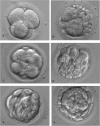Effect of cytoplasmic fragmentation on embryo development, quality, and pregnancy outcome: a systematic review of the literature
- PMID: 38745305
- PMCID: PMC11092204
- DOI: 10.1186/s12958-024-01217-7
Effect of cytoplasmic fragmentation on embryo development, quality, and pregnancy outcome: a systematic review of the literature
Abstract
The role of cytoplasmic fragmentation in human embryo development and reproductive potential is widely recognized, albeit without standard definition nor agreed upon implication. While fragmentation is best understood to be a natural process across species, the origin of fragmentation remains incompletely understood and likely multifactorial. Several factors including embryo culture condition, gamete quality, aneuploidy, and abnormal cytokinesis seem to have important role in the etiology of cytoplasmic fragmentation. Fragmentation reduces the volume of cytoplasm and depletes embryo of essential organelles and regulatory proteins, compromising the developmental potential of the embryo. While it has been shown that degree of fragmentation and embryo implantation potential are inversely proportional, the degree, pattern, and distribution of fragmentation as it relates to pregnancy outcome is debated in the literature. This review highlights some of the challenges in analysis of fragmentation, while revealing trends in our evolving knowledge of how fragmentation may relate to functional development of the human embryos, implantation, and pregnancy outcome.
Keywords: Embryo development; Fragmentation; Implantation; In vitro fertilization; Pregnancy outcome.
© 2024. The Author(s).
Conflict of interest statement
The authors declare no competing interests.
Figures



References
-
- Cummins JM, Breen TM, Harrison KL, Shaw JM, Wilson LM, Hennessey JF. A formula for scoring human embryo growth rates in in vitro fertilization: Its value in predicting pregnancy and in comparison with visual estimates of embryo quality. J In Vitro Fertil Embryo Transfer. 1986;3:284–95. doi: 10.1007/BF01133388. - DOI - PubMed
Publication types
MeSH terms
LinkOut - more resources
Full Text Sources

